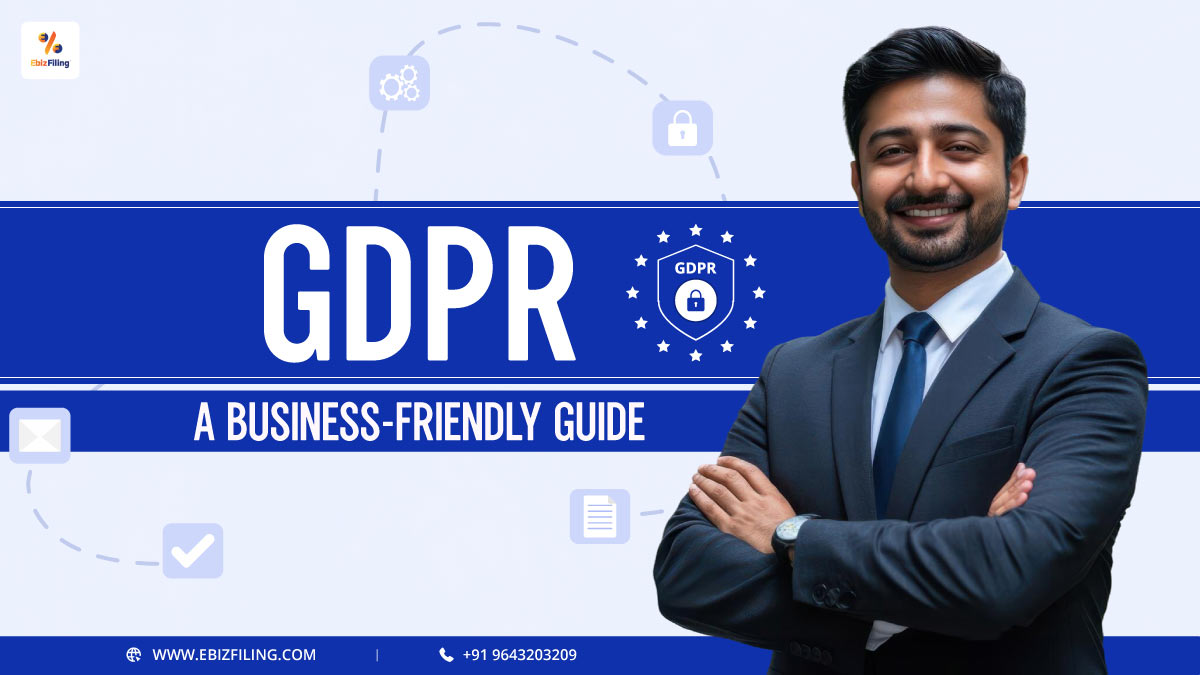
-
August 4, 2025
-
ByDhruvi D
General Data Protection Regulation (GDPR) Compliance: A Complete Guide
GDPR compliance is required if your company gathers, keeps, or uses personal data belonging to individuals in the EU. Understanding GDPR, its complete scope, fundamental ideas, and what your company must do to be compliant are all covered in this guide.
In brief:
-
The General Data Protection Regulation is known as GDPR.
-
It is applicable to any company that handles EU citizens’ data.
-
Transparency, data security, and privacy are the main concerns of the law.
-
It gives people a number of data rights.
-
Fines for noncompliance might reach €20 million.
-
Indian businesses that deal with EU customers are likewise required to follow the rules.
What is GDPR and Why Was It Introduced?
In May 2018, the European Union unveiled a new regulatory framework known as the General Data Protection Regulation (GDPR). Giving people control over their personal data and streamlining data protection regulations throughout Europe are its goals.
Prior to GDPR, EU countries had different data protection regulations. The 1995 Data Protection Directive was superseded by GDPR, which established a single, consistent standard. Growing concerns over how businesses gather and use personal information online prompted its introduction.
Who Needs to Comply with GDPR?
GDPR compliance is necessary for all non-EU businesses, not only those in the EU, that:
-
provides goods or services to EU citizens.
-
gathers personal information from citizens of the EU
-
tracks or keeps an eye on the online activity of EU people
Therefore, you must abide by GDPR requirements if you deal with EU clients or consumers, regardless of whether you operate your business in the USA, India, or another nation.
Key Principles of GDPR
GDPR is based on seven key principles that all organizations must follow:
-
Lawfulness, fairness, and transparency: You must clearly explain what data you’re collecting and why.
-
Purpose limitation: Only use the data for the purpose it was collected.
-
Data minimization: Collect only the data you truly need.
-
Accuracy: Keep data up to date and correct.
-
Storage limitation: Don’t store data longer than necessary.
-
Integrity and confidentiality: Protect data with proper security measures.
-
Accountability: Be able to show how you comply with these principles.
These principles apply to everything from marketing emails to customer sign-up forms and data storage practices.
What Counts as Personal Data Under GDPR?
Personal data refers to any information that can directly or indirectly identify an individual. This includes:
-
Names and email addresses
-
Phone numbers
-
Location data or IP addresses
-
Banking or credit card details
-
Photos, videos, or biometric data
-
Social media activity
-
Health and insurance records
What Are the Key GDPR Rights for Individuals?
GDPR gives individuals several rights over their personal data:
-
Right to access: Users can ask what personal data you have and how it’s used.
-
Right to correction: They can request updates to incorrect or incomplete data.
-
Right to erasure: Also called the right to be forgotten.
-
Right to restrict processing: Users can limit how their data is used.
-
Right to object: They can refuse data use for marketing or profiling.
-
Right to data portability: They can ask for their data in a portable format.
-
Right to be informed: They must know why and how their data is collected.
Businesses must have processes in place to respond to such requests within 30 days.
Steps to Ensure GDPR Compliance
In order to comply with GDPR regulations, companies should:
-
Perform a data audit to determine what personal information you gather and where it is kept.
-
Examine your privacy statement and make sure it is understandable, truthful, and straightforward.
-
Obtain legitimate user consent by using opt-in techniques for cookies and forms.
-
Put robust security measures in place by using access control, encryption, and frequent updates.
-
Everyone who handles data should be familiar with the fundamentals of GDPR.
-
Assign a Data Protection Officer (DPO); Required for large-scale data handlers.
-
Create a plan for responding to breaches. You have 72 hours to notify any data breaches.
GDPR Penalties for Non-Compliance
GDPR sets out two tiers of administrative fines, plus other corrective actions like warnings or temporary bans on data processing:
|
Violation Level |
Maximum Penalty |
Applies When… |
|
Tier 1 |
Up to €10 million or 2% of the company’s global annual revenue (whichever is higher) |
For violations related to record-keeping, data impact assessments, lack of cooperation with supervisory authorities, or not appointing a DPO where required |
|
Tier 2 |
Up to €20 million or 4% of the company’s global annual revenue (whichever is higher) |
For more serious violations like unlawful data processing, lack of valid consent, breach of user rights, or failure to implement adequate security measures |
GDPR and Indian Companies
Numerous Indian businesses manage the data of EU clients, particularly those in the IT, SaaS, marketing, and outsourcing sectors. You must abide by GDPR if your company does the same.
Action items for Indian companies:
-
With clients in the EU, sign Data Processing Agreements (DPAs).
-
Update your websites’ privacy and cookie policies.
-
Install safe servers or collaborate with cloud providers that adhere to GDPR.
-
Educate your staff about GDPR procedures.
Ignoring GDPR could result in data prohibitions, lost business, or even legal notices from EU authorities.
Conclusion
GDPR is more than just another rule to follow. It signifies a change in the way that data privacy is seen and implemented around the world. Establishing the proper procedures and being aware of GDPR requirements demonstrates your dedication to user privacy and fosters enduring trust. GDPR compliance is essential whether you handle EU data, whether you’re in Europe, India, or anywhere else. We offer more related services such as Annual Compliances for Pvt Ltd and Limited Liability Partnership.
FAQs on GDPR
1. Is GDPR only applicable to businesses within the European Union?
No, GDPR applies to any business that processes personal data of individuals in the EU, regardless of where the business is located.
2. Do Indian companies need to appoint a Data Protection Officer under GDPR?
Indian companies must appoint a Data Protection Officer (DPO) only if they process large volumes of sensitive data or handle systematic monitoring of EU data subjects.
3. What qualifies as valid consent under GDPR?
Valid consent must be freely given, specific, informed, and unambiguous, typically through an opt-in mechanism with a clear explanation of what the user is agreeing to.
4. Can small businesses be fined under GDPR regulations?
Yes, even small businesses can face penalties if they fail to comply with GDPR requirements, especially in cases of negligence or repeated violations.
5. How soon must a company report a data breach under GDPR?
Companies are required to report a personal data breach to the relevant supervisory authority within 72 hours of becoming aware of it.
6. Does GDPR require businesses to delete customer data upon request?
Yes, under the “right to be forgotten,” individuals can request deletion of their data, and businesses must comply unless they have a lawful reason to retain it.
7. What happens if a business fails to respond to a GDPR data access request?
Failure to respond to a data access request within 30 days can result in complaints, investigations, and potential fines from data protection authorities.
8. Are cookie consent banners necessary for GDPR compliance?
Yes, if your website collects cookies from EU visitors, you must display a consent banner and allow users to choose which cookies they accept.
9. Is storing personal data on cloud servers compliant with GDPR?
Storing personal data on cloud servers is allowed under GDPR, but only if the cloud provider offers adequate data protection and is GDPR-compliant.
10. Can GDPR compliance be achieved through a one-time checklist?
No, GDPR compliance is an ongoing process that requires continuous monitoring, regular audits, staff training, and updates to data handling practices.
Pvt Ltd Annual Filing
Stay Compliant with Pvt Ltd Annual Filing, Expert Help by EbizFiling
About Ebizfiling -










February 9, 2026 By Steffy A
Compliance Calendar in the Month of March 2026 Introduction March 2026 is an important compliance month for businesses as it includes regular monthly filings along with advance tax payment deadlines. Most returns relate to February 2026 transactions under GST, […]
January 31, 2026 By Dhruvi D
Filing Requirements Across Multiple States Explained Clearly Introduction As businesses grow, selling or operating beyond one state often feels like progress. But with that growth comes a new layer of compliance that many business owners underestimate. Filing requirements across multiple […]
January 31, 2026 By Dhruvi D
Essential Federal Tax Forms Every US Taxpayer Should Know To Start With, Federal taxes in the United States are filed using specific forms, each designed for a particular purpose. Many taxpayers assume they only need one form, but in reality, […]